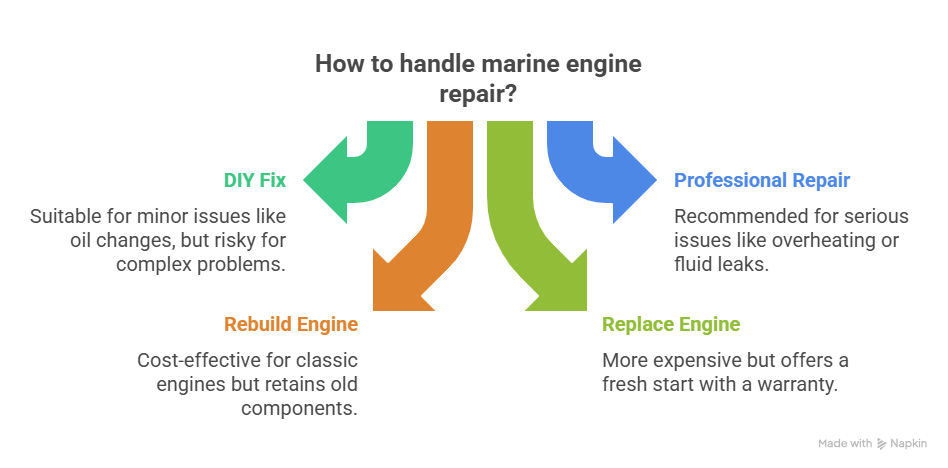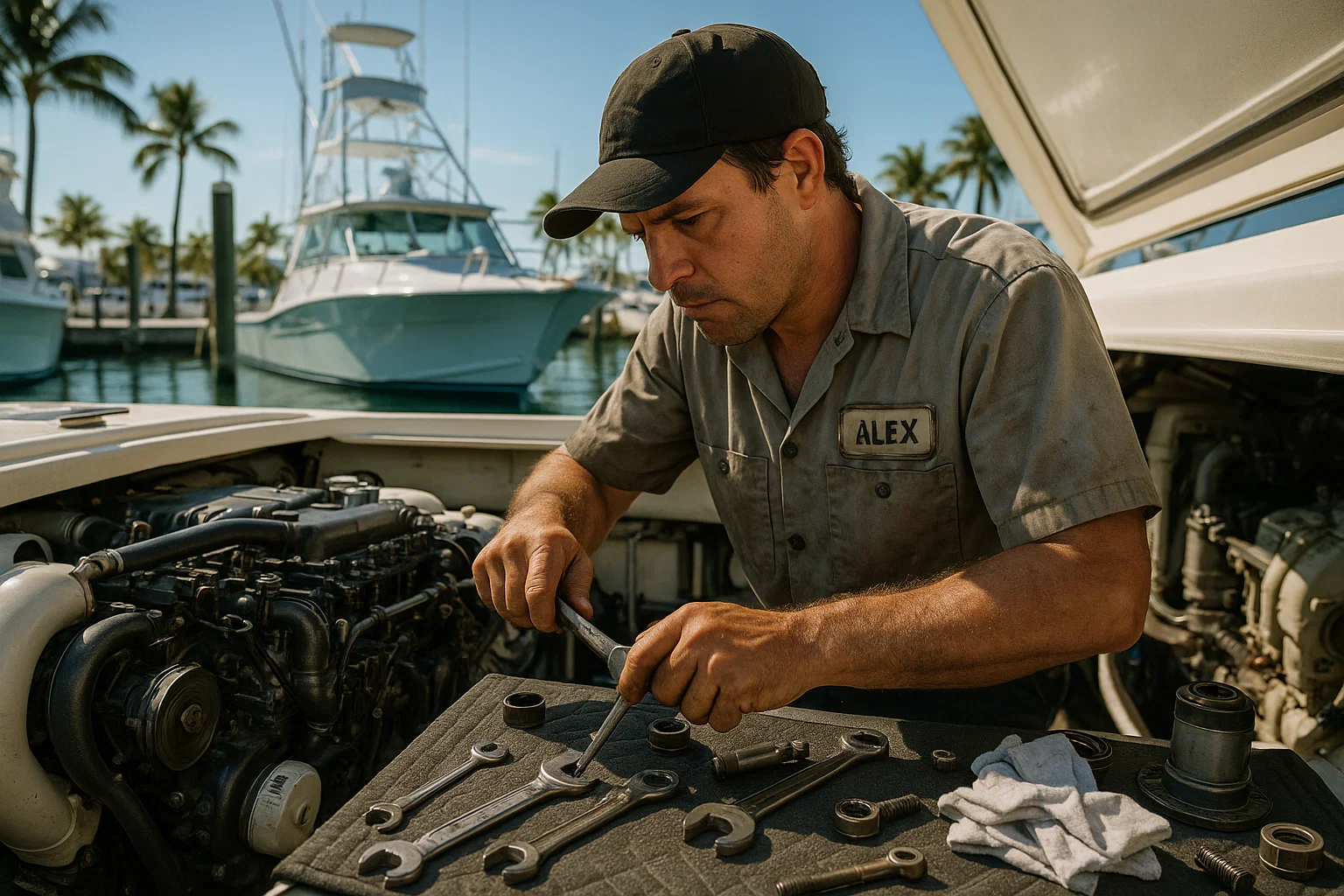“My Engine Just Died Off Stiltsville!”
I’ve been fixing boat engines in Miami for close to 20 years, and I can tell you, the panic in a boater’s voice is always the same. Last July, I got a call from a guy named Ray. His Sea Ray 350 just sputtered and died halfway to Stiltsville. He was drifting, with his family on board, frantically searching his phone for “marine engine repair near me”. That’s a call I get at least once a week during the season.
When your engine—the heart of your boat—gives up, it’s more than an inconvenience. It’s stressful, it can be dangerous, and it’s the start of a journey you don’t want: finding someone you can trust not to rip you off.
The problem is, how do you sort the real pros from the hacks when you’re in a jam? A cheap fix can end up costing you double down the road. I’ve seen it happen more times than I can count.
So, let’s talk straight. I’m going to walk you through how to handle this, from figuring out what’s wrong to finding a reliable marine engine repair near me without getting taken for a ride. This is the advice I give my own friends.
Table of Contents
First, What Is Your Engine Trying to Tell You?
Before you even pick up the phone, take a breath and play detective. The more you can tell me, the faster I can help. When someone calls, I need to know two things: what kind of engine we’re dealing with, and what it’s doing.
Are we talking about a Yamaha outboard, a Mercruiser inboard, or a big old Volvo Penta diesel? Each one is a different beast. Then, give me the symptoms. Is it refusing to start? Overheating? Making a noise that sounds like a bag of wrenches in a blender? These details are gold. They help a good mechanic start diagnosing the problem before they even step on your boat.
When to Stop and Make the Call
Look, I’m all for DIY fixes. Changing your own oil or spark plugs is great. But some things are not for amateurs. If you’re dealing with any of these, it’s time to find a professional for marine engine repair near me:
- Persistent Overheating: This is a big one. Don’t ignore it.
- Serious Power Loss: The engine runs, but has no guts.
- Weird Smoke: Blue, white, black—it all means something, and none of it is good.
- Fluid Leaks: Oil in the bilge or a sheen on the water is a major red flag.
- Grinding or Knocking: That’s the sound of expensive internal parts screaming for help.
Trying to fix these yourself without the right tools and experience can turn a $500 repair into a $5,000 engine replacement. Don’t gamble.
How to Spot a Good Mechanic (And Avoid the Bad Ones)
Finding a trustworthy shop when you’re searching for marine engine repair near me can feel like a crapshoot. Here’s what I look for, and what should make you run the other way.
Certifications Aren’t Just Wallpaper
First thing I check is their credentials. Are they ABYC (American Boat and Yacht Council) certified? That’s the baseline. More importantly, are they certified for your brand? If you have a Yamaha, you want a Yamaha-certified tech. It means they’ve been trained on your specific engine and have access to the right diagnostic software. A generalist is fine for an oil change, but for complex repairs, you want a specialist.

Reputation is Everything in This Town
In the Miami boating community, word gets around fast. Ask people at your marina. Check local boating forums and Facebook groups. A shop can buy all the Google ads they want, but a personal recommendation from a fellow boater is worth its weight in gold. If you hear the same name recommended over and over, that’s a good sign. If you’re looking for marine engine repair near me, your local community is your best resource.
Real Parts and a Real Warranty
This is a hill I’ll die on: a good shop uses genuine manufacturer parts (OEM). Sure, aftermarket parts are cheaper, but they often don’t fit right and they don’t last. If a quote seems too good to be true, ask what kind of parts they’re using.
And any mechanic worth their salt will stand behind their work. Ask about their warranty. You should expect at least a 30-day warranty on labor. If they won’t guarantee their work, walk away. Finding a quality marine engine repair near me means finding someone who is accountable.
To make it simple, here’s how I break down the options when you’re searching for marine engine repair near me:
| Shop Type | Best For | My Take (Alex’s Opinion) |
|---|---|---|
| Dealer Service Center | Warranty work, newest models, complex computer diagnostics | Expensive, but they have the latest tools and training direct from the manufacturer. |
| Independent Shop | Out-of-warranty repairs, older engines, general maintenance | Often better value. Find one that specializes in your engine brand. My kind of place. |
| Mobile Mechanic | Dockside emergencies, routine service at your location, pre-purchase inspections | Super convenient, but make sure they’re certified and insured. Their overhead is lower, but rates can be high for emergencies. |
The Money Talk: Repair Costs and the “Rebuild or Replace” Dilemma
Let’s talk about the bill. Down here in Miami, shop labor rates can run anywhere from $150 to $225 an hour (2025 rates). A simple diagnostic might take an hour or two. A full engine overhaul can take days. Always, always get a written estimate before any work begins.
Sooner or later, you’ll face the big question: rebuild or replace? I had this conversation with a customer last spring about his 20-year-old Mercruiser. A rebuild was going to cost about $8,000. A new remanufactured engine was $12,000.
Here’s how I advised him to think about it:
- Rebuild: Cheaper upfront. Good for a classic engine if you can find a skilled mechanic. But, you’re still left with old surrounding components (harnesses, sensors).
- Replace: More expensive, but you get a fresh start, often with a multi-year warranty. A new engine also boosts the boat’s resale value. For his boat, he went with the replacement for the peace of mind.
Thinking about the long-term value of your investment is crucial when evaluating options for marine engine repair near me.
How to Avoid Calling Me in a Panic
Want to avoid that frantic search for “marine engine repair near me” at sunset? Do your maintenance. Seriously. Half the emergency calls I get are from problems that could have been prevented with basic care: regular oil changes, replacing impellers, checking fuel filters. An hour of prevention is worth a thousand dollars in cure.
Find a good mechanic before you need one and build a relationship. Let them do your annual service. When they know your boat, they spot small problems before they become big ones. That’s the smartest money you can spend. Finding a long-term marine engine repair near me is the goal.
FAQ: Quick Answers from the Shop Floor
How much does it cost just to look at my engine?
Most shops charge a one or two-hour diagnostic fee. Here in Miami, expect to pay between $150 and $400 just to find out what’s wrong.
Is it worth fixing my old 2-stroke outboard?
Honestly, it depends. If it’s a simple fix, maybe. But with today’s fuel and environmental regulations, sinking a lot of money into an old 2-stroke is often a bad investment.
How do I know I’m not getting ripped off?
Get a second opinion, especially for a big job. Ask for a detailed, itemized estimate in writing. A good mechanic will be happy to explain every line item to you.
Can you come to my boat, or do I have to bring it to you?
Many shops, including mine, offer mobile service for a fee. It’s perfect for routine maintenance or diagnostics. For major overhauls, the boat usually has to come to the shop where we have all the heavy tools.
Why is marine repair so expensive?
It’s a tough environment. Parts are specialized and have to resist corrosion. Access is often terrible—sometimes I have to be a contortionist just to reach a bolt. And liability is high. It’s a specialized skill, and rates reflect that. When you need expert marine engine repair near me, you’re paying for that expertise.
Conclusion: It’s About Trust, Not Just a Transaction
At the end of the day, your engine is what gets you home safely. Finding a good mechanic is about building a relationship with someone you can trust with your boat and your safety. It’s not just a one-time fix.
The goal isn’t just to solve today’s problem, but to find a partner who will help you keep your boat running reliably for years. By being an informed boat owner, you can turn a stressful breakdown into a confident decision.
Here are the key takeaways to remember:
- Know When to Call for Help: Recognize critical symptoms like overheating or knocking noises and don’t try to be a hero.
- Do Your Homework: Look for certified mechanics with a strong local reputation. Ask your fellow boaters for recommendations.
- Get It in Writing: Always insist on a detailed, written estimate before work starts and ask about the warranty on parts and labor.
- Think Long-Term: Build a relationship with a trusted mechanic. Proactive maintenance is always cheaper than emergency repairs.
- Use Your Local Network: Your best bet for finding a great marine engine repair near me often comes from a recommendation at your local marina, not just a Google search.
Author Bio
I’m Alex, a 15-year marine technician in South Florida, ABYC-certified. I’ve worked on everything from Yamaha outboards to Volvo Penta diesels. From emergency tows off Key Biscayne to complete engine rebuilds at Bahia Mar, my goal has always been to get boaters back on the water safely and with confidence.


Leave a Reply